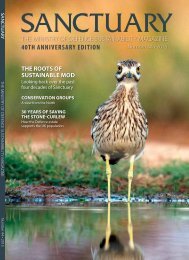SUSTAINABILITY
UBUt5
UBUt5
Create successful ePaper yourself
Turn your PDF publications into a flip-book with our unique Google optimized e-Paper software.
AROUND THE REGIONS<br />
25<br />
Cyprus<br />
Sovereign Base<br />
information. The relevant legislation<br />
must be considered when planning<br />
normal garrison and battalion beach<br />
activities such as physical training and<br />
summer parties.<br />
Loggerhead turtle swimming in Cyprus © Mick Smith/Dragon Divers, Cyprus<br />
The beaches in the British Sovereign<br />
Base Areas (SBAs) in Cyprus are<br />
important nesting sites for the<br />
endangered green Chelonia mydas and<br />
loggerhead Caretta caretta turtles.<br />
Sea-tur tles in Cyprus are protec ted as<br />
priorit y species under the Protec tion<br />
and Management of Nature and<br />
Wildlife Ordinance (implementing<br />
the provisions of the Habitats<br />
Direc tive), enac ted in 2007. Despite<br />
this protection, disturbance to<br />
nesting beaches and illegal killings<br />
are not uncommon.<br />
Since 1990, sea-turtle conservation<br />
projects in both SBAs, carried out by<br />
volunteers and overseen by the SBA<br />
Environment Department, have<br />
monitored the turtle beaches to find<br />
and protect nests, assess hatch-success<br />
and record any dead turtles found. The<br />
information collected is used to inform<br />
policy decisions regarding sea-turtles<br />
and their habitats.<br />
The work undertaken by volunteers is<br />
invaluable. They are on nesting<br />
beaches on a daily basis, which is an<br />
enormous asset to enforcement<br />
action, reporting damaging activities<br />
such as camping, driving on beaches,<br />
dogs on beaches, illegal fishing etc, as<br />
they happen.<br />
The Western Sovereign Base Area<br />
(WSBA) turtle project, covering a<br />
number of beaches, has benefitted<br />
from long-standing and enthusiastic<br />
volunteers, as well as, until last year,<br />
involvement from the University of<br />
Glasgow. The Eastern Sovereign Base<br />
Area (ESBA) project covering two<br />
beaches, has suffered from a lower<br />
profile, poor recruitment of committed<br />
and interested individuals in recent<br />
years, and high volunteer turnover.<br />
These beaches over time have become<br />
increasingly important for nesting<br />
turtles, with the numbers of nests and<br />
hatch-success showing a general<br />
increase. Because they are located on<br />
military bases, these beaches are<br />
potentially better protected from<br />
disturbance than other beaches in<br />
Cyprus. To achieve this potential,<br />
protecting the turtles and their nests<br />
during the sensitive period of nesting<br />
and hatching (May-October) could be<br />
made more effective by overcoming the<br />
challenges of regular changes to<br />
garrison staff and serving battalions, and<br />
high volunteer turnover. Ensuring that<br />
the required conservation measures are<br />
implemented relies on the projects and<br />
the legislation protecting the turtles<br />
being given due consideration, and on<br />
all new and existing staff being updated<br />
regularly with turtle conservation<br />
Just recently, all turtle nesting beaches<br />
within the SBAs have been included in<br />
the List of Areas of European<br />
Environmental Interest published<br />
under the Protection and Management<br />
of Nature and Wildlife Ordinance. They<br />
will soon be formally designated as<br />
Special Areas of Conser vation.<br />
Now funding is needed to raise<br />
awareness across military communities<br />
and the wider SBAs about turtles and<br />
their fragile status. The ESBA would<br />
benefit from the employment of a<br />
conservation offcer to cover the project.<br />
With help from charities such as the UK<br />
Overseas Territories Conservation Forum<br />
funding is being sought to support and<br />
enhance both these projects.<br />
Dr Phoebe Carter<br />
Ecologist and volunteer for UK<br />
Overseas Territory Conservation Forum<br />
Loggerhead hatchling making the long journey to the<br />
sea at Dhekelia beach, ESBA. Only 1 in 1000 hatchlings<br />
will survive to adulthood © Dr Phoebe Carter<br />
98<br />
Sanctuary 44 • 2015



